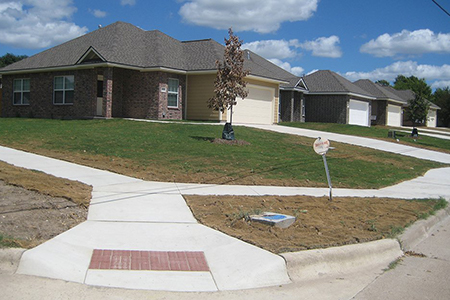Community Development
Contact Us
1803 Greenfield Plaza, Bryan, TX 77802 | Phone: (979) 209-5175 | Email Us
Upcoming Events
Our funding sources include Community Development Block Grants (CDBG) and the HOME Investment Partnership Program, both under the umbrella of the United States Department of Housing and Urban Development. Our mission is to utilize these funds to enhance the Bryan community by developing and preserving affordable housing and promoting fair housing and neighborhood integrity.
Although many of our programs assist in providing services and facilities for low and moderate income citizens, and senior citizens, we also connect the entire community with valuable resources available in the City of Bryan.
Annual Action Plans
- City of Bryan Approved 2023 Annual Action Plan | Executive Summary
- City of Bryan Approved 2022 Annual Action Plan | Executive Summary
- City of Bryan Approved 2021 Annual Action Plan | Executive Summary
- City of Bryan Approved 2019 Amended Annual Action Plan | Executive Summary
- City of Bryan Approved 2018 Annual Action Plan | Executive Summary
- City of Bryan Approved 2017 Annual Action Plan | Executive Summary
- City of Bryan Approved 2016 Annual Action Plan | Executive Summary
Consolidated Action Plans
- City of Bryan Approved Amended 2020-24 Consolidated Plan and 2020 Annual Action Plan | Executive Summary
- City of Bryan Approved 2015-2019 Consolidated Plan and 2015 Annual Action Plan | Executive Summary
- HUD End-of-Year Assessment Letter for Program Year 2022
- 2020 Consolidated Annual Performance Evaluation Report (CAPER)
- 2019 Consolidated Annual Performance Evaluation Report (CAPER)
- 2018 Consolidated Annual Performance Evaluation Report (CAPER)
- 2017 Consolidated Annual Performance Evaluation Report (CAPER)
- 2016 Consolidated Annual Performance Evaluation Report (CAPER)
- 2015 Consolidated Annual Performance Evaluation Report (CAPER)
Homebuyer / Homeowner Assistance Programs
- Homebuyer Assistance Program
- Homeowner Major Rehabilitation Assistance Program
- Homeowner Minor Repair Program
- Voluntary Demolition Assistance Program
- Home Foundation Initiative Program
Applications for the Minor Repair Program in the current funding year are now closed. Applications will reopen for the next funding year on Oct. 1, 2024.
Community Assistance Programs and Resources
Public Service Agencies and Facility Funding
The City of Bryan may allocate up to 15% of the annual Community Development Block Grant (CDBG) funds received from the US Department of Housing and Urban Development (HUD) to assist local, non-profit Public Service Agencies to provide new services or a quantifiable increase in existing services to benefit primarily low to moderate income citizens of the City of Bryan. In addition to funding non-profit public services, Community Development Block Grant funds are also used in the acquisition of property, rehabilitation or construction of non-profit public facilities, building or repair of public infrastructure and purchase of park equipment.
HUD Fair Housing
Fair housing protections are guaranteed and regulated by federal, state, and local statutes, ordinances, regulations, guidelines, and executive orders. No person shall be subjected to discrimination because of race, color, religion, sex, disability, familial status, age, or national origin. These are known as “Protected Classes”. Discriminatory housing practices are prohibited in all housing-both publicly and privately-owned and developed housing. For more information, visit: HUD Fair Housing website.
Fair Housing Complaints
If you have been trying to buy or rent a home or apartment and you believe your rights have been violated, you can file your fair housing complaint online with the U.S. Department of H.U.D:
Fort Worth Regional Office of FHEO
U.S. Department of Housing and Urban Development
801 Cherry Street, Unit #45
Suite 2500
Fort Worth, Texas 76102
(817) 978-5900
1-800-669-9777
TTY (817) 978-5595
See: HUD WebsiteOr, contact the Texas Workforce Commission Civil Rights Division:
Texas Workforce Commission
Civil Rights Division
1117 Trinity Street, Rm. 144-T
Austin, Texas 78701
888-452-4778
Texas Workforce Commission WebsiteCity of Bryan Fair Housing Ordinance
As part of its mission to administer federal grants, the City of Bryan’s Community Development Department is required by Executive Order 12892 to affirmatively further fair housing in the programs and activities within its jurisdiction. The City of Bryan has adopted a Fair Housing Ordinance under Chapter 58, Article II of the City of Bryan Code of Ordinances and conducts an Analysis of Impediments to Fair Housing Choice update every five years to coincide with the 5-Year Consolidated Plan process.
Information for Contractors and Bidders
Information for Contractors and Bidders
For information concerning bidding on projects contracted by the City of Bryan’s Community Development Department, please visit the city’s Purchasing Services page for information concerning how to become a registered vendor, and to view active and expired bids:
To register as a provider of minor repairs (contracts under $5,000) for such repairs as roofing, HVAC, electrical, plumbing, handicap accessibility, etc., please download and return our Minor Repair Contractor Information form.
Registration as a Section 3 Business
As part of the City of Bryan’s Section 3 Plan to provide business opportunities to low-income businesses and persons, contractors are invited to register as a Section 3 Business. Registration as a Section 3 Business certifies that the business is either:
- (A) 51% Owned by a low-income person or resident of public housing in the College Station-Bryan MSA; or,
- (B) At least 30% of the employee workforce of the business are low-income persons or residents or public housing in the College Station-Bryan MSA; or,
- (C) Commits to subcontract at least 25% of the work to businesses in category (A) and (B).
To register as a Section 3 Business, please review the City of Bryan’s Community Development Section 3 Plan
View Section 3 Compliance Plan
Then, complete the certifications and applicable affidavits, and submit them to:
Section 3 Certification
Community Development Department
1803 Greenfield Plaza
Bryan, TX 77802
For assistance, please call (979) 209-5175 and request assistance with Section 3 Certification.





